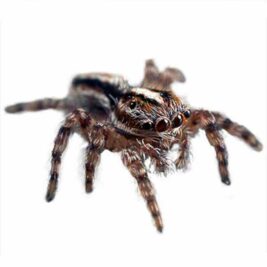SPIDER CONTROL
PURCOR Pest Solutions can help keep spiders away from you, your loved ones, and your home through our targeted spider control services.
"*" indicates required fields
With over 40,000 species around the world, spiders are a diverse group of arachnids that have adapted to living in all but the coldest conditions and underwater. Many species build either an orb-shaped or a funnel-shaped web, while others burrow in the ground or live free-range.
Unfortunately, sometimes spiders build their homes in yours. If you’re dealing with spiders in your home, PURCOR Pest Solutions can help. Request a free spider control estimate today!
Common House Spiders in the United States
Brace yourself for this factor: you can find over 3,500 species of spiders in the United States. Fortunately, the majority of these spider species are not dangerous to people or pets. You can find a wide range of harmless house spiders around your living space, including:
- Cellar spiders
- Giant house spiders
- Hobo spiders
- House spiders
- Jumping spiders
- Orb-weaver spiders
- Wolf spiders
- Yellow sac spiders
However, you should never get comfortable around two certain species of spiders: black widow spiders and brown recluse spiders. Black widow spiders and brown recluse spiders carry neurotoxic and neurotic venom, respectively.
If a black widow spider bites you, your loved ones, or pets, its neurotoxic venom targets your central nervous system, causing cramping, muscle spasms, vomiting, and difficulty breathing. A black widow spider bite can even be fatal for young children, the elderly, and small pets.
Alternatively, a brown recluse spider bite is almost never fatal but can cause serious damage to the bite area. Necrotic venom can cause permanent damage to skin tissue if left untreated.
When you or your loved ones are bitten by a spider, monitor the bite site and the bitten person for symptoms. Contact a medical professional if you have any concerns regarding the spider bite.
Are spiders dangerous?
Although most species do not pose a health threat to humans, the black widow spider and the brown recluse are venomous and have been found throughout the United States. Their bites can result in sometimes life-threatening harm. Many people are also severely afraid of spiders, making them feel uncomfortable in their own homes or preventing them from enjoying certain outdoor activities.
Where do spiders live?
Most spiders are predators and capture insects with their webs or by ambush, and will set up residence wherever there is a viable food source. Outdoors, spiders may be found under logs and rocks or in vegetation. They can also enter homes through gaps around windows and doors or hitch a ride on outdoor furniture, gear, or firewood that is brought indoors.
Common places around the home to find spiders include:
- Basements
- Corners of rooms
- Dark, cluttered areas
- Crawl spaces
- Gardens
- Lawns
- Health Risks
How to Deal with Spiders
Do-it-yourself spider control methods may provide temporary peace of mind or relief against spiders, but spraying peppermint oil around your home will only keep these pests at bay for so long. For targeted, effective solutions for spiders in your home, you need licensed spider control professionals. At PURCOR, we use industry-leading technology and techniques to safeguard your property against spiders.
After we conduct a thorough inspection of your property, our certified pest control technicians will offer a variety of spider control recommendations. For existing spider issues, we offer spider control services that target the infestation at its source. We apply environmentally-conscious treatments throughout your home that are safe for you and your loved ones, but tough on spiders and other unwanted pests.
How to Prevent a Spider Infestation
Until PURCOR has a chance to safeguard your home against spiders, you can do several things to minimize your chances of an infestation. Keep dark, quiet spaces, such as closets and under beds, clear of clutter and consistently cleaned. Spiders often lay their eggs in these spaces because they are quiet and undisturbed. By vacuuming regularly, you can remove any spiders or eggs that may be hiding.
Request Your Free Spider Control Estimate Today
Give yourself the peace of mind you deserve against spiders trying to invade your home. Whether you have an existing spider issue or want to prevent future ones, PURCOR is here to help with effective spider control and prevention services. Request your free spider control estimate online today.
OTHER PURCOR SERVICES
- In2Care Mosquito Station for Effective Control
- Pest Control Insulation
- Field Mice Control
- Gopher Control
- Ground Squirrel Control
- French Drains
- Bird Removal Services
- Homeowners Association (HOA) Pest Control
- Bat Control and Removal
- Cricket Control
- Snake Removal
- Bee Control
- Crawl Space Restoration and Clean-Up
- Vapor Barrier Installation, Repair, and Replacement
- Fly Control
- Flea Control
- Tick Control
- Bed Bug Control
- Wasp Control
- Exclusion Services
- Mosquito Control
- Scorpion Control
- Termite Control
- Occasional Invaders
- Cockroach Control
- Ants
- Weed Abatement & Lawn Care
- Wildlife Control & Removal
- Crawlspace Services
- Commercial Pest Control
- Residential Pest Control
Frequently Asked Questions
While DIY methods may help in making your spider infestation better, the rewards of using them are not worth the risk. Home remedies require you to do the dirty work and get you within range of a spider (or a spider infestation). DIY methods are also not a guarantee that your infestation will disappear.
There are a plethora of different spider species in North America alone and not everyone is venomous or harmful to humans. However, that does not mean you should get comfortable with a spider’s presence in your home.
The two species of spiders that you should look out for are brown recluses and black widows. Both of these species carry neurotic venom that targets your central nervous system and cause a series of ailments such as muscle cramps, vomiting, difficulty breathing, and more.
